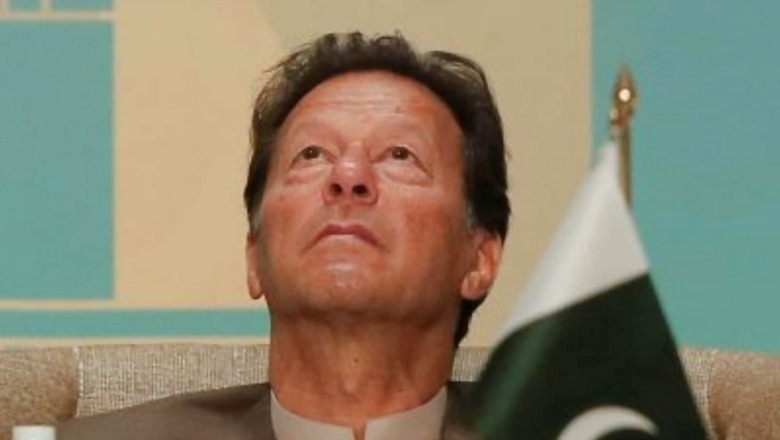
views
Pakistan President Arif Alvi earlier on Sunday dissolved the National Assembly (NA) on advice of Prime Minister Imran Khan, minutes after Deputy Speaker Qasim Suri rejected a no-confidence motion against the premier, who had effectively lost the majority in the 342-member lower house of Parliament.
Suri said the no-confidence motion against Khan violated Article 5 of Pakistan’s Constitution.
In the chaos that ensued immediately after, the Opposition said it would challenge the order in the country’s Supreme Court (SC), as the cricketer-turned-politician called for fresh polls.
Meanwhile, the court ordered all parties not to take any “unconstitutional” measures and adjourned the hearing until Monday.
What is Article 5 of the Pakistan Constitution?
Article 5, under the heading, “Loyalty to State and obedience to Constitution and law” has two of the following clauses:
1. Loyalty to the State is the basic duty of every citizen.
2. Obedience to the Constitution and law is the 10[inviolable] 10 obligation of every citizen wherever he may be and of every other person for the time being within Pakistan.
How did Khan buy time using Article 5?
Law Minister Fawad Chaudhry said that it has been established that through a “letter” that the no-confidence motion was being used to bring a regime change on the behest of a foreign power, so it was against Article 5 of the constitution of Pakistan. “It is an effective operation for a regime change by a foreign power. It is not an issue of no-confidence but Article 5,” he said and urged the chair to give ruling on the legality of the no-confidence move.
Consequently, Deputy Speaker Suri issued his ruling, rejecting the no-confidence motion and adjourning the session. The opposition termed the entire process to reject no-confidence against the prime minister and dissolution of assembly against the constitution and its lawmakers refused to leave the premises of the parliament house.
Is the assembly dissolved now?
The president’s secretariat issued a statement saying, “The president of Pakistan, Dr Arif Alvi, has approved the advice of the prime minister of Pakistan to dissolve the National Assembly under Article 58 (1) read with Article 48(1) of the Constitution of the Islamic Republic of Pakistan.”
What was Opposition’s reaction?
“We are going to challenge the ruling by the deputy speaker and advice by the prime minister to dissolve parliament in the Supreme Court,” said Shehbaz Sharif, Leader of the Opposition in the parliament.
Bilawal Bhutto Zardari, head of the opposition Pakistan People’s Party, said. “What Imran Khan has done is against the laws. We’re approaching our lawyers. The speaker has also done undemocratic work. Imran Khan has exposed himself through this move. We will be present inside the National Assembly until this decision is reversed.”
Pakistan Muslim League-Nawaz leader Marriyum Aurangzeb said, “Imran Khan is a traitor (gaddar). He has taken an unconstitutional step and we are now protesting in National Assembly and will not go anywhere until this decision is cancelled”.
Experts also criticized the dissolution, which has created a constitutional crisis in Pakistan. Pakistani lawyer Reema Omer said that there are no “ifs and buts” and the “speaker’s ruling is blatantly unconstitutional”.
What’s next in Pakistan?
Imran Khan, after the deputy speaker made the no-confidence motion void, asked the public to prepare for elections. “No corrupt forces will decide what the future of the country will be. When the assemblies will be dissolved, the procedure for the next elections and the caretaker government will begin,” the 69-year-old cricketer-turned-politician said.
The Supreme Court will hear arguments on Monday and later rule on whether Prime Minister Imran Khan and his allies had the legal right to dissolve parliament and set the stage for early elections. The opposition is challenging the latest moves by Khan as a ploy to stay on as prime minister. It has also accused him of economic mismanagement.
The most significant decision before the Supreme Court is whether Suri, the deputy speaker, had the constitutional authority to throw out the no-confidence vote, according to constitutional lawyer Ali Zafar.
Pakistan’s powerful military which has directly ruled the country for more than half of its 75-year history has remained silent through much of the political infighting.
Read the Latest News and Breaking News here















Comments
0 comment